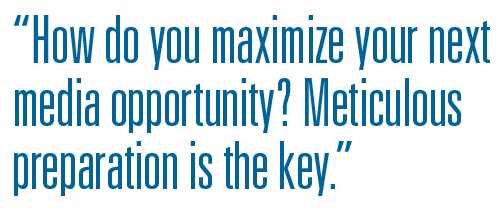The vital importance of live sports programming has fueled the rapid rise of sports media license revenue. While event spectators through turnstiles number in the thousands, that figure is dwarfed by the many millions consuming your product via a host of media platforms. Thus your media deals directly shape the majority perception of your brand, in addition to representing a huge, growing revenue stream.
High-performing sports properties are unique enterprises, active in more than a dozen different businesses at once, typically executing across a single staff. Today, more than ever, media exploitation is at the heart of it all, driving revenue, promotion and branding. Maximizing enterprise performance and value are driven by optimizing your media rights strategy.
My experience has taught me that each media rights negotiation presents a momentous opportunity to position your business for long-term competitive success. These occasions are infrequent, so each team/property needs expert assistance developing and executing its plan. How do you maximize your next media opportunity? Meticulous preparation is the key. Solving your unique TV rights puzzle can be best achieved starting with a foundation built on answering the following critical questions:
Company Business Culture
 |
With so many platforms, and so many options, sports properties are wise to do their homework before entering the media rights marketplace.
Photo by: Getty Images |
1. Risk tolerance: Deep down, is your organization risk-tolerant or risk-adverse? Is team ownership prepared to absorb possible startup losses and/or performance variations? Do you prefer to focus on the basics of tickets, suites and sponsorship sales, and use your media deal as a way to lay off financial risk, or do you instead view media as an entrepreneurial avenue to be maximized?
2. Core competency: Is your organization media savvy, with extensive internal media sales, production, and marketing knowledge, active and current in today’s marketplace? Or does direct involvement in the business represent a departure from what you are truly good at?
Rights Valuation/Growth
3. Value metrics/drivers: What do you deserve for your rights? What is the fair market value today? Is your existing deal above or below market? What are the key drivers that establish value? What can you do to affect them? Which recent transactions are (and are not) appropriate comparables?
4. Cash flow/bonuses/growth rates: Do you think of your media revenue as integrated with your entire business, or rather as a means to fund new initiatives, or solve cash-flow issues? Is it better to front load, back load or ramp up your deal? What is typical? What kind of deal-over-deal increases can you expect? Should you ask for signing and/or performance bonuses?
Business Partners
5. Network profitability/priorities: What are the critical success factors for a sports network business? How do network affiliation/distribution agreements work? How important are ratings? What new initiatives and/or rights are
networks looking for today? How profitable is your current partner? What are the key drivers of its economics and how do your rights contribute? How much is available for rights fees and profit? What issues are must-haves or deal-breakers for Fox, CSN, ESPN or NBCSN?
6. New network dynamics/equity: What are the considerations for starting a new network (an RSN or team/league-branded platform) and/or distributing your games/product in nontraditional methods? Should you partner with other teams/leagues, private equity or a similar fund/investor, with a distributor, or go it alone? How does tiering work? What are the implications for obtaining full distribution? How should you look at equity value vs. rights fees? What are the key governance issues that you need to focus on in a media partnership?
Marketplace
7. Competitors: How competitive is your marketplace? What alternatives exist to your current distributor(s)? How much of a difference does this make in your value? How is your relationship with your current partner? Which potential partner might be best suited to your organization? What are the risks to changing partners? Is a third party or your existing rights holder best positioned to monetize your rights? How can you legally find out if your current agreement restricts you from having certain third-party discussions?
8. Geography/league rules/national networks: What is the impact of your territory/marketplace on your value? How many subscribers can you access? How does the value of your rights change with distance? What league outer-market limits/assessments are applicable? What is the current state of applicable league rules/subjugation, revenue-sharing parameters and network pre-emption/blackouts?
9. Industry trends: How do megatrends like over-the-top, cord cutters/shavers/nevers, social media and TV Everywhere affect your rights? How does industry consolidation affect the marketplace? Should you seriously consider a nontraditional platform?
10. Exclusivity/programming allocation: What are the benefits and value of exclusivity? What is your optimal game/programming allocation between platforms (over-the-air, cable network, broadband) or another platform (e.g., an alliance with an MVPD, Internet brand or retailer)?
Negotiation Strategy
11. Timing: When should you start preparations and negotiations? What are the advantages and disadvantages of negotiating a new deal early? How long should the process take? What are your existing obligations to your current partner, and how will they affect your strategy?
12. Process: Who should drive the negotiations process? Should you go first to outline your expectations or wait for a proposal? How should you react to proposed elements you don’t like? When should you involve the lawyers?
Business Integration
13. Media integration: How should your arrangements integrate with your sponsorship and ticket sales, community relations, digital platforms, arena/stadium operations and other important business initiatives?
14. Control: How important is it to control the production and presentation of your media content? Sponsorship/ad sales? Category exclusivity? What are the trade-offs? What alternatives maximize control while minimizing risk?
15. Marketing/promotion: What opportunities are available through a media agreement to maximize fan engagement with your brand and foster better awareness of your product? How can your deal better help to build your brand and market your franchise/league? What levels of on-air and tune-in promotion are advisable?
Key Nonfinancial Deal Points
16. Programming: What kinds of nongame/event programming commitments can you offer/obtain through a rights negotiation? How can these be valued?
17. Downside protection: What insurance is important to you in a new deal? Reopeners? Resets? Extension options? Material change? Programming prioritization? Most favored nation clauses? Assignment limits?
18. Grant of rights: What elements should you include and reserve in your rights agreement? What scope will a third party insist upon? How can you increase the value of your rights package, while protecting future opportunities? How will you ensure that you will retain the new technology and multimedia assets needed to properly promote sales, sponsorship, and run your business in the future?
19. Term/back-end rights: What length deal term should you consider? When should you go long or short? What back-end rights are optimal/acceptable to you?
20. Other nonfinancial terms: What other benefits are provided by your current agreement? What is lacking? What tactics increase the likelihood your arrangement will be successful?
Media negotiations are not just about a number. Having solid, fully considered answers to these questions, sets up a successful outcome. A wise enterprise will take significant time in advance to work through these and other questions, and be properly educated prior to entering the marketplace. Doing so will help level the playing field. Only then can you expect the ultimate outcome to propel your business and enhance your brand.
Ed Desser is president of Desser Sports Media (www.desser.tv), specializing in sports media rights negotiations, strategic planning, rights and asset valuations, mergers and acquisitions, and expert witness consulting. Desser has negotiated or advised on over $40 billion in sports media rights and transactions.






